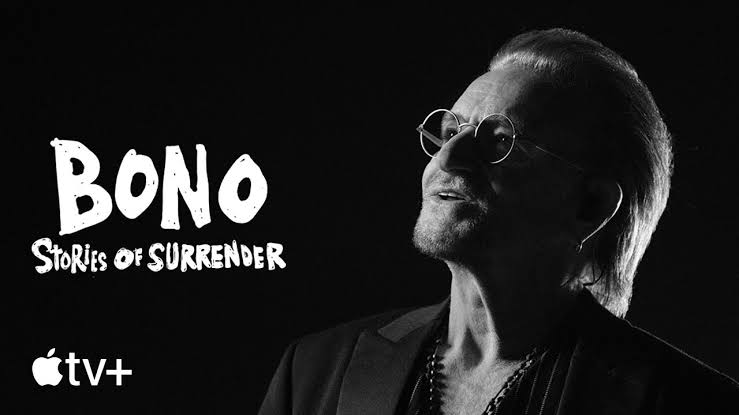**“Bono: Stories of Surrender” Review – The U2 Legend Finds What He’s Looking for in a Captivating Film of His One-Man Show**
In *Bono: Stories of Surrender*, the legendary frontman of U2 trades stadiums for intimacy, presenting a stirring, often vulnerable portrait of a rock star grappling with memory, mortality, and meaning. Based on his 2022 memoir *Surrender: 40 Songs, One Story*, this cinematic adaptation of his one-man show is a compelling fusion of storytelling, performance, and theatrical flourish—a stripped-down but emotionally rich journey through Bono’s life, both public and private.
Directed by longtime U2 collaborator Willie Williams, the film captures Bono on stage in a cozy Paris theatre, armed with little more than a microphone, some sketches, and a small musical ensemble. It’s a striking departure from the bombast of U2’s legendary live shows. Here, Bono is not the commanding rock god but the aging artist, reflective and disarmingly open. He shares stories of his upbringing in Dublin, the grief of losing his mother at 14, his complex relationship with his father, and his decades-long romance with his wife Ali. The tales are interwoven with reimagined versions of U2 songs, each carefully chosen to echo or deepen the narrative being told.
What makes *Stories of Surrender* so effective is Bono’s sincerity. There’s no posturing, no artifice. He’s not trying to be cool—he’s trying to be honest. Whether he’s recounting an early gig in a half-empty club or describing the visceral panic of heart surgery, he does so with a poet’s cadence and an actor’s command. The result is often moving, occasionally funny, and always deeply human.
Musically, the film benefits from its sparseness. With cellist Kate Ellis, harpist Gemma Doherty, and keyboardist Jacknife Lee providing elegant accompaniment, U2’s stadium anthems are distilled into something more delicate. “With or Without You” becomes a meditative confession; “Sunday Bloody Sunday” simmers with new poignancy. These stripped-back arrangements complement the narrative, emphasizing the lyrics and Bono’s voice, now more textured and expressive with age.
Visually, the film is inventive without being overbearing. Hand-drawn illustrations animate portions of the story, adding whimsy and visual interest. Williams’ direction is subtle but effective, shifting the camera in ways that make us feel as if we’re sitting in the theater ourselves. Lighting is used to dramatic effect, and there’s a theatrical sensibility that underscores Bono’s comfort with performance—even in this scaled-down form.
What’s perhaps most striking about *Stories of Surrender* is how it reframes Bono’s identity. He’s spent decades as a global icon, a celebrity activist, and a lightning rod for criticism and admiration alike. But here, he’s simply Paul Hewson from Cedarwood Road. There’s humility in the way he speaks of his bandmates—The Edge, Adam Clayton, Larry Mullen Jr.—and their bond over 40 years. There’s tenderness in the way he recalls Ali’s unwavering support through fame, fatherhood, and near-death. And there’s an underlying question: What does it mean to matter? To endure?
Of course, Bono has always been a polarizing figure. His tendency to blend activism with artistry has drawn both praise and ridicule. *Stories of Surrender* doesn’t shy away from this. He pokes fun at his own messiah complex, acknowledging that even his most earnest causes were sometimes delivered with more ego than grace. But this self-awareness adds to the authenticity. He’s not just telling stories—he’s reckoning with them.
While the film may not convert Bono skeptics, it offers something rare in the rock-doc genre: introspection. There are no tour bus hijinks or behind-the-scenes melodrama. Instead, *Stories of Surrender* is a quiet, elegant portrait of an artist trying to make sense of a life lived loudly. And it succeeds, not through grandeur, but through grace.
In the end, *Bono: Stories of Surrender* is more than just a companion piece to a memoir. It’s a master class in personal storytelling, a testament to the enduring power of music, and a reminder that even rock legends carry scars and regrets. But perhaps most of all, it’s a love letter—to family, to friendship, and to the strange, beautiful mess of being alive.
For Bono, surrender isn’t about giving up—it’s about letting go. And in this quietly powerful film, he does just that.

